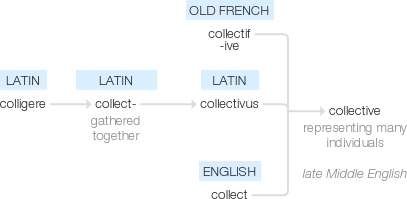Collective
late Middle English (in the sense ‘representing many individuals’): from Old French collectif, -ive or Latin collectivus, from collect- ‘gathered together’, from the verb colligere (see collect1).
wiktionary
From Middle French collectif, from Latin collēctīvus, from collēctus, past participle of colligō(“I collect”), from com-(“together”) + legō(“I gather”). Compare French collectif. Doublet of colectivo.
etymonline
collective (adj.)
early 15c., collectif, "comprehensive," from Old French collectif, from Latin collectivus, from collectus, past participle of colligere "gather together," from com- "together" (see com-) + legere "to gather" (from PIE root *leg- (1) "to collect, gather"). In grammar, from mid-15c., "expressing under a singular form a whole consisting of a plurality of individuals." From c. 1600 as "belonging to or exercised by a number of individuals jointly." Related: Collectively; collectiveness.
Collective bargaining was coined 1891 by English sociologist and social reformer Beatrice Webb; it was defined in U.S. 1935 by the Wagner Act. Collective noun is recorded from 1510s; collective security first attested 1934 in speech by Winston Churchill.
As a noun, from 1640s, "a collective noun" (singular in number but signifying an aggregate or assemblage, such as crowd, jury, society). As short for collective farm (in the USSR) it dates from 1925; collective farm itself is first attested 1919 in translations of Lenin.
